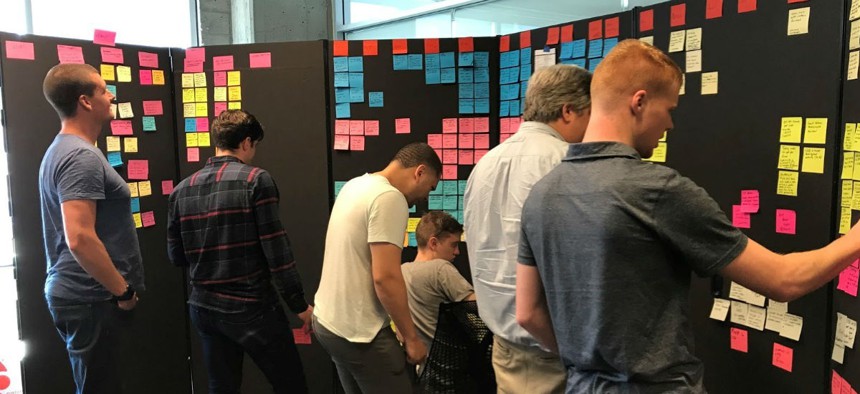Want to Work with Air Force’s Kessel Run? Better Move Fast.

Airman 1st Class Maxwell Lehmann (right), 2nd Contracting Squadron specialist, works with a group for the Kessel Run project. Air Force
The experimental lab is looking for partners to supply “the best software developers in the world.”
Kessel Run, the Air Force’s nascent startup-like software development group, laid out three new contracting opportunities ranging from $15 million to $50 million each to supply technical talent to its Boston-based lab.
Launched last May, the experimentation lab’s mission is to revolutionize the way the Air Force builds and delivers software by developing it organically and in-house.
“The next war will be a war of cognition,” Maj. Matt Nelson, Kessel Run project manager, said at the start of the event. Kessel Run ultimately aims to build software that will enable America to “keep up with a data-driven war.”
And Kessel Run expects to move at a fast pace. The group released a request for information March 1 with capability statements due by March 15. Kessel Run then will set one-on-one interviews and coding challenges with “the most capable sources” March 20 through 26. Market research should be complete by April, clearing the way for solicitations, Nelson told industry day attendees Friday. Each contract has a three-year period of performance.
The first opportunity, Software Toolchain Services, has an estimated value of $15 million to $30 million. Nelson said the team is looking for end-to-end management of commercial off-the-shelf software tools, such as Slack, Adobe and others that enable Kessel Run teams to work with each other. In this category, they are targeting people who can provide “situational awareness into which product teams are using what tools” and who can provide recommendations on how Kessel Run can continuously improve all of its programming tools, which it collectively refers to as the Toolchain.
“We want strong coders and engineers who can help automate the implementation of these tools and procurement agents who understand the marketplace and really know what these tools are,” Nelson said.
The next opportunity, Kessel Run Enterprise Services, or KRES, has an estimated value of $30 million to $50 million to provide technical services to support the enterprisewide Kessel Run platform. This will include creating and implementing Kessel Run’s Pivotal Cloud Foundry deployments, ensuring platform environments on multiple networks are stable and reliable, integrating the platform with external enterprise core services and supporting the application development teams in determining the status of environments and other troubleshooting issues.
“From a unique opportunity perspective, this one is pretty awesome,” Nelson said. “If our senior leaders’ vision comes to fruition, Kessel Run will become a platform anyone in the Air Force or [Defense Department] can use.”
Kessel Run is also looking for full-stack web developers under the Software Development Capability contract, estimated to be worth $25 million to $50 million. Among other priorities, people who work in this capacity are expected to ensure any new developments will adhere to 12-factor application architectures, ensure the software code base and documentation meets the security controls, and also ensures the software code being developed is supported by automated tests.
Software developers, programmers, and engineers would work best and the presentation said contractors “shall implement lean practices to employ continuous delivery and instill a team dynamic which responds to changes.”
During the industry day, Nelson also discussed the specific requirements for applicants to fulfill.
“We want industry partners to come in and be part of the culture we’ve already established,” he said.
Notably, he emphasized the need for industry applicants to be familiar with Boston’s technological landscape and be willing to live and work in Boston. He said Kessel Run already tried the “remote-work approach,” and that that endeavor failed.
“We are trying to change the culture in the Air Force and the only way to do that is to set up this ecosystem where everyone is collaborating together in one space,” Nelson said.
He also said that while it is mandatory for applicants to be United States citizens, they do not need a secret security clearance upfront. Instead, they need to be eligible to apply for a secret security clearance.
“The best software developers in the world—that is what we are looking for,” Nelson said.
NEXT STORY: VA to Pilot Health Records System in March 2020






